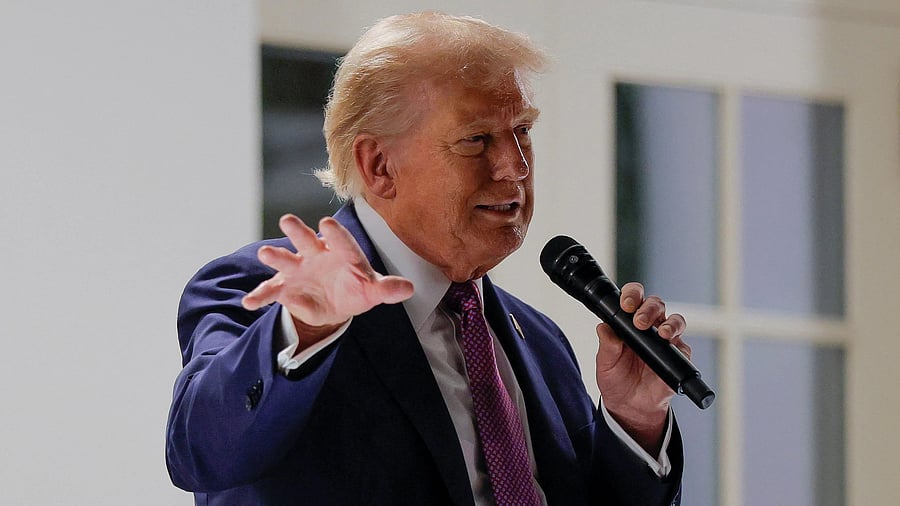
US President Donald Trump
Credit: Reuters Photo
If you thought political sycophancy, theatrics, and flattery were the preserve of developing nations, think again. Donald Trump’s second presidency has given the world exactly that spectacle: a display of deference bordering on the surreal by his Cabinet and ‘experts’ during an August 26 Cabinet meeting. He extoled his own genius, his vision, even his supposed Nobel credentials. As Gideon Rachman recently observed in his FT column, such fawning is not comic relief — it is an authoritarian signal. Where candour is punished, sycophancy becomes the currency of survival.
Trump is, therefore, less an American aberration than a bellwether. His reliance on ritualised loyalty and delusional beliefs mirrors a broader pathology that has marked strongman rule across continents, and across human history.
While prosperity endures and national pride swells, acolytes proclaim their leader’s indispensability, and his power appears impregnable. Yet, the same supporters who trumpet devotion in one season will repudiate their patron in another, once economic crisis, foreign policy failure, or domestic unrest renders that leader vulnerable.
This choreography of loyalty is not confined to Washington. From Latin America’s populist caudillos to Africa’s long-serving presidencies, the cycle is recognisably the same: lavish devotion in the boom years, followed by sudden desertion when fortunes reverse.
In Brazil, generals once feted Jair Bolsonaro, only to distance themselves as political and economic turmoil mounted. In Zimbabwe, Robert Mugabe’s decades-long grip on power dissolved almost overnight when his party withdrew its blessing. Even in ostensibly institutionalised systems, such as Hungary under Viktor Orbán or Türkiye under Recep Tayyip Erdoğan, the durability of authority rests less on ideology.
Nor is the US immune. Its political tradition reveals how flattery has long distorted decision-making at the highest levels. Franklin Roosevelt’s unprecedented four terms were marked by courtiers who muted their doubts to remain within his orbit. Richard Nixon was shielded from hard truths by aides who assured him of his invincibility until Watergate’s tide swept them all away. Even Ronald Reagan, for all his popular appeal, was surrounded by advisers who preferred to affirm rather than to challenge — a dynamic that contributed to the Iran-Contra debacle.
What distinguishes Trump is not the existence of sycophancy, but its scale and brazenness: where earlier presidents at least cloaked the theatre of loyalty in discretion, Trump has elevated it into a public ritual, demanding — and rewarding — professions of devotion in full view of the world.
History provides no shortage of parallels. In the courts of Rome, emperors were sustained by extravagant homage, yet the same Senate that acclaimed them ‘Augustus’ one day could sanction their assassination the next. Medieval monarchies across Europe thrived on elaborate rituals of loyalty, but dynasties crumbled overnight when harvests failed, or wars were lost. The cycle is ancient: the stronger the cult of personality, the more ruthless the eventual abandonment.
The arc of history is replete with such examples, reminding us that hubris is as old as leadership itself. Leaders intoxicated by adulation mistake it for permanence, when in truth it is as fleeting as circumstance. The Athenian statesman Alcibiades was once hailed as indispensable, only to be cast out when fortunes turned. Napoleon Bonaparte, too, revelled in the ovations of Europe until a single miscalculation on the Russian plains revealed the fragility beneath. Trump’s US democracy is merely yet another chapter in this older human story.
If political courtiers enable the rise and fall of strongmen, economic elites are often their indispensable accomplices. Capitalist lobbies are rarely seduced by ideology; they are seduced by certainty. Strongmen, by concentrating power, promise what markets crave above all else: predictability.
Regulations can be rewritten overnight, labour unrest suppressed, and contracts secured through proximity to the throne rather than the vagaries of courts or parliaments. For corporate elites, the autocrat’s favour offers a fast track to profit, while the risks of long-term fragility are conveniently discounted.
It is no accident that Italian industrialists once rallied behind Mussolini, that German conglomerates found common cause with Hitler, or that Latin America’s military juntas were backed by domestic business elites. Trump’s first term revealed the modern variant of this bargain: Wall Street and corporate America quietly overlooked his assaults on institutions so long as tax cuts were delivered, financial regulations dismantled, and markets buoyed.
The transactional pattern is perennial: capital supplies legitimacy and resources, while the strongman supplies access and protection. Yet this arrangement is perilously myopic — for when the leader falters, the same lobbies that once proclaimed his indispensability will engineer their exit, leaving society to bear the ruins.
For financiers and investors, this bargain is doubly treacherous. Regimes governed by sycophancy become brittle. Data is distorted, risks ignored, and policies shaped to flatter rather than to solve. Markets often mistake orchestrated loyalty for resilience — only to be blindsided when the façade fractures. The lesson for capital is stark: the more extravagant the praise surrounding a ruler, the greater the hidden peril in the system they command.
Trump is, therefore, more than an American curiosity. He is a case study in the fragility of strongman systems, a mirror to the hazards of sycophancy across time and geography.
Srinath Sridharan is a corporate adviser and independent director on corporate boards. X: @ssmumbai.
Disclaimer: The views expressed above are the author's own. They do not necessarily reflect the views of DH.